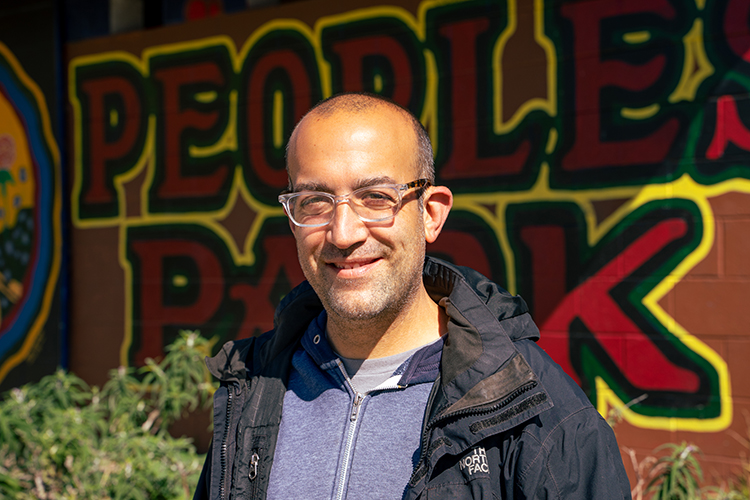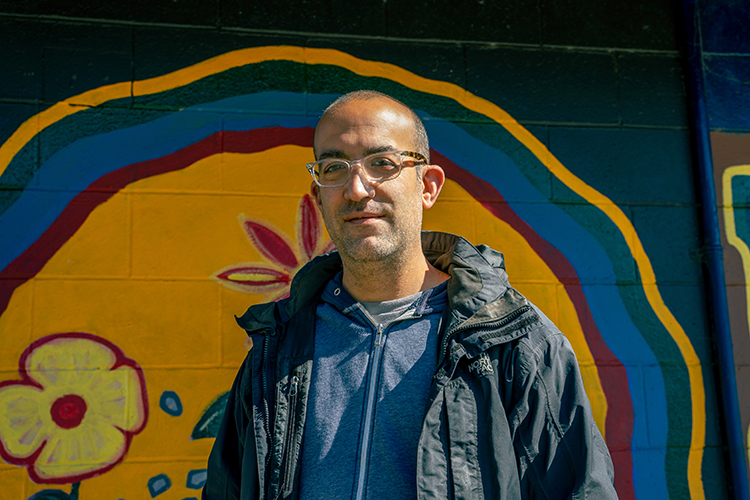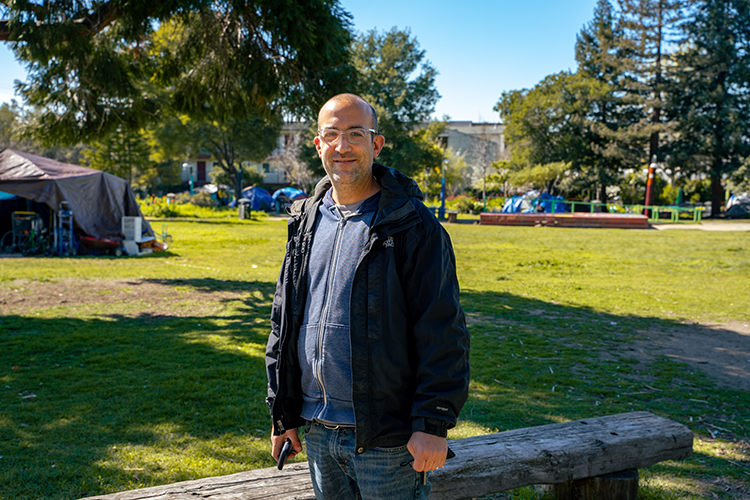Tough job, light touch: Campus social worker assists area’s homeless
Since 2017, Ari Neulight, as UC Berkeley's homeless outreach coordinator, has assessed the needs of the people at People's Park and others lacking housing, food, medical attention and human kindness on and near campus.
February 24, 2022

Ari Neulight, the campus’s homeless outreach coordinator, is a full-time social worker who connects some of the area’s most vulnerable residents to resources, like housing, and to health and social services. (UC Berkeley photo by Neil Freese)
Ari Neulight’s days are fast-paced, often chaotic. During the first hours of a recent morning, UC Berkeley’s homeless outreach coordinator delivered mail to inhabitants of People’s Park from a group P.O. box he’s set up for them. He then woke a man in a tent, brought coffee and sent him via Uber to his disability assessment appointment. Meanwhile, others awaited his help re-charging their phones. Someone’s eyeglasses had broken, a man needed pants, a woman banned from a local pharmacy for her behavior needed her meds. “Can I meet with you later?” several others asked Neulight.
Appointments with city, county, religious and business leaders also fill Neulight’s calendar, especially as construction nears at the historic park near campus. There, UC Berkeley will build both student housing and supportive housing for unhoused and very low-income people, revitalize 1.7 acres of green space, and establish a public tribute to the land’s history. The nearly 50 people currently sleeping at the park will be offered access to shelter and services.
Since 2017, Neulight, a full-time social worker, has built relationships with some of the area’s most vulnerable residents, connecting them to resources, like housing, and to health and social services. “It takes a long time to gain somebody’s trust when they’re homeless, but Ari’s a huge success,” said Sam Davis, Berkeley professor emeritus of architecture, who conceived of Neulight’s position. “He’s gotten more than 100 people housed.”
Initially a two-year position, Neulight’s job, a unique one in higher education, soon became a five-year position, then a permanent one. “We knew he would be successful,” Davis said.
“I try to do my best every day,” said Neulight of his work philosophy. “I have a deep appreciation for people trusting me and inviting me into their worlds and their journeys. I don’t take this lightly and see it as a precious gift and true honor.”
Berkeley News recently spoke to Neulight about why he’s a social worker, what he’s learned from his job, what he enjoys about it, and what’s next for himself and for the unhoused people of People’s Park.

Neulight attended UC Berkeley beginning in 1992 and studied psychology, then went on to get master’s degrees in psychology (at the University of Wisconsin) and in social work (at San Francisco State University). But he said his heart was in community work, not a career in research and academics. (UC Berkeley photo by Neil Freese)
Berkeley News: How did your interest in social work develop?
Ari Neulight: One of the most informative things I ever did was to be part of Camp Galil, in Pennsylvania, not far from where I grew up. It was a young Jewish leadership space, set up like a kibbutz, and I started when I was 13 and left at 21. It ran each summer for eight weeks and included a leadership training program; eventually I was a camp counselor there. Galil also had activities during the year. We did collective problem-solving and activities around equity and justice, sang old labor and leftist songs, did Israeli dancing, and worked in the community. Woven through all this were deep values, and all of us who were part of this later launched into similar types of work.
I came to Cal in 1992, but had visited when I was younger. I remember a protest on animal vivisection, and I saw the campus was a space that was exciting, dynamic and activated, and remember thinking, “I want to go here.” I first studied psychology, but also volunteered at the Lincoln Child Center (formerly in Oakland), interned at Napa State Hospital in the teen ward, and did a project at the School of Social Welfare on the mental health system.
I didn’t know much about People’s Park then, other than having started attending Berkeley when Rosebud Denovo, an activist, was killed after breaking into the chancellor’s house with a note demanding an end to construction at People’s Park. A sand volleyball court recently had been built there.
I wove my way back to San Francisco after getting a master of science in psychology at (the University) of Wisconsin while leaving a Ph.D. program early — my heart wasn’t in research and academics; it was in community work. I first worked for (the nonprofit) Mission Housing (Development Corp.), doing tenant support and advocacy work. Eventually, I was a social worker there through a contract they had with Baker Places (a counseling and mental health support nonprofit) and then at Episcopal Community Services (of San Francisco).
I got my master of social work degree from San Francisco State University and worked for about 10 years at Glide Memorial Church initially doing therapy and case management, and then became clinical program manager and then clinical program director there.
I’ve always loved weaving among training, teaching, supervision, advocacy work, policy and direct service. For about seven years while at Glide I also supported students doing their field experience in social work from UC Berkeley, Cal State East Bay, USC and other schools. I have continued mentoring Cal students in my current position.

People’s Park, says Neulight, “is always a reminder to me that people survive, they build community where they can.” (UC Berkeley photo by Neil Freese)
What interested you in being UC Berkeley’s homeless outreach coordinator?
When I took the job, it was brand new. I knew I would be assessing the needs of people in People’s Park, helping them out, working with Berkeley students, possibly doing some research. I also knew there was a vision for development of the park. I had to spend time sitting with the whole thing, wondering what it would mean to be at the park, knowing the challenges and the controversy of that space. I knew I had the ability to operate there, and I ultimately felt it was OK, that I could be effective.
I liked the idea of coming back to Berkeley, to a place that, to me, was really meaningful, where I’d had positive partnerships and could create programs and be of benefit to people.
It was weird, at first. Awkward. I was by myself a lot. I spent a lot of time listening. I went out to every possible community organization and met with local officials and went to People’s Park regularly, but I tried not to go too much — it’s their home, their space. I tried to be a good guest, a good listener, a good partner and a good neighbor. I spent a lot of time putting my thinking together, and I had thinking partners.
Eventually two things happened: I helped a few people with some little things, and that built the possibility for doing more. I didn’t introduce myself as “a new university worker here to help.” I just said, “I’m here to help,” to see if helping could capture my role in the community.
The second thing was that Eve Ahmed, a social worker for the city of Berkeley, walked around with me and helped with connections. People trusted her, and she became a bridge to new relationships.

Neulight’s job also includes guiding graduate students in social work field placements and research projects on homelessness. (UC Berkeley photo by Neil Freese)
What is life like at the park today, compared to before the pandemic?
It’s an ever-changing population, and it’s a rough place to be. It has its own dynamics. There are people there every day, people who come and go, people who disappear and then show up again, but have long ties with their “family” in the park. In one corner of the park, the southeast corner, there used to be a younger group of travelers, but we haven’t really seen them during COVID.
Before COVID, people there regularly would say it felt like home, but that didn’t mean they were living there. People would spend most of their days there, with their stuff, but you couldn’t be at the park after 10 p.m. They’d close the restrooms.
The biggest change was the pandemic. Tents got set up at the park, and people were allowed to remain there, when we shifted to a shelter-in-place process. The university partnered closely with the city and the county and had a public health focus around COVID information, PPE access, sanitation, and helping with things like how close the tents were to each other. We had lots of conversations with the people there about COVID.
The park is probably a situation where certain people feel really unsafe there, others think it’s the safest situation they’ve been in, and then everything in between. We have a deep responsibility to do better for folks. Almost everyone I come across, they want housing. That’s a rare thing, that people don’t want housing. It does happen, and for some it makes sense — they’ve had really negative experiences inside institutions.
The park is always a reminder to me that people survive, they build community where they can. People here in the park are more likely to be victims of violence and crime than they’re likely to be perpetrators. I think we can do better than provide a place where people have tents and sleep and are surviving in a central area of Berkeley.

On a recent afternoon, Neulight spoke on the phone at People’s Park to the nonprofit LifeLong Medical Care — its street teams partner with Neulight and the campus to bring care to underserved people. (UC Berkeley photo by Neil Freese)
Describe your approach to working with homeless people, at the park and elsewhere.
It’s often light touch relationship-building that can take a year, with some people, and I still don’t always find a way through. I just keep a door open, a connection, and I’m there when they need clothes or something to eat. At the next level, I help get them a (California) I.D., maybe a birth certificate, maybe some initial benefits. Maybe the next level is trying to get someone on disability, which is a more rigorous process that’s often linked to behavioral health and primary care services. And then there’s housing. I feel really good when someone wants to work on those things, and I can shepherd them to success, get them with a team (of helpers) and then step back and cheerlead. After that, I check in with them, ask how things are going.
But this isn’t where everyone is at. And who’s going to be here at People’s Park in six months is different from who is here now. And houselessness is a structural and societal issue that reaches really everywhere.
So, I care and help and do what I can. Just showing up is meaningful in itself, and powerful, and shouldn’t be seen as either insignificant or enough. You never know the impact you are having with something as simple as a hello or a smile, or meeting a basic need in the moment. Never underestimate what small gestures and kindness can do.
I also remind myself that I am a guest in people’s “homes” and in their communities, and I try to be as gracious a guest as possible in my interactions.
My focus has always been on whether I am doing right by people at the park day to day, and if the university is doing right by the folks who are there. I’ve been really impressed, to be honest, with the university being interested in doing it right. I get the sense that this chancellor wants to do something different, and the mayor, and they’ve brought resolve and vision (to the plan for People’s Park). Without their leadership, it wouldn’t be possible.

“It takes a long time to gain somebody’s trust when they’re homeless, but Ari’s a huge success,” said Sam Davis, Berkeley professor emeritus of architecture, who conceived of Neulight’s position. “He’s gotten more than 100 people housed.” (UC Berkeley photo by Neil Freese)
Would you share a few highlights of your time in this job?
There was one guy I helped with his housing process who was always really appreciative and called me his angel, at times. On my birthday, he and some of his friends called me and sang to me a Kirtan (West Indian)-style birthday song. I never knew that he knew it was my birthday.
A woman whose partner died of an overdose at the park reconnected with her family through her housing and disability process and her own poor health. It was amazing to see the world that opened up for her and the life that became possible.
I’ve been working for four years on housing for a woman who’s had lots of jail time and hospitalizations. But she leaned in and invited me in and has stuck with letting me build a team around her, and she’s continued to say yes through lots of difficult days. She keeps finding a way back to yes.
I also think of those people that I didn’t realize I did anything for, but who call me with a thank you and good news around where their journeys to stability through hardship — when I met them — took them. I think of activists who tell me that I am the only good thing the university has done.

People’s Park will be developed soon into both student housing and supportive housing for unhoused and very low- income people. Neulight says that shelter will be made available for those currently living in the park, as well as a space to be during the day. (UC Berkeley photo by Neil Freese)
Change is coming to People’s Park. How will that impact your work?
Everyone knows the park’s going to be developed soon, and that we won’t be able to be there. Most people at the park say, “We’re here until we can’t be here.” Most people live a very day-to-day life; it’s really about surviving today.
For some people, the loss of the park will be painful, and my heart goes to them. People’s Park means different things to different people, and they’ve gone there for a range of reasons often saying things like its — “the only space where I could survive,” “a place my family took me when I was younger, and I climbed a tree,” “a place where values were fought for, that represented possibility and hope,” “a place where my identify developed, and now I’m losing part of myself.”
The through line has been that there will be an opportunity for unhoused people to have shelter elsewhere, support for them toward a process of housing and a space to be during the day. A few years ago, I worked with a graduate student on recommendations for what was needed alongside the development (of People’s Park). The two things that really emerged were a place to sleep and a place to be during the day to access services.
Homelessness is structural and embedded in our system, and there will always be a need to support people from homelessness to stability. My role hasn’t just been about People’s Park; it’s about supporting unhoused folks in and around the district, including on central campus, down Telegraph and up to Willard Park. And I broadly support the campus in a lot of ways.
Our plan is to partner with the city, county and nonprofits … and to roll with the need. To be open and flexible, as we’ve been with my position, to what’s really going to support (unhoused) people, as well as the learning needs of students. To bring knowledge gained through my position to influence policies and protocols that affect unhoused people. And to continue to explore the role of the university in being a good neighbor.
I want to be part of our success and to help support the transition. My position, and being on the ground to help navigate, will keep those questions and conversations moving forward.